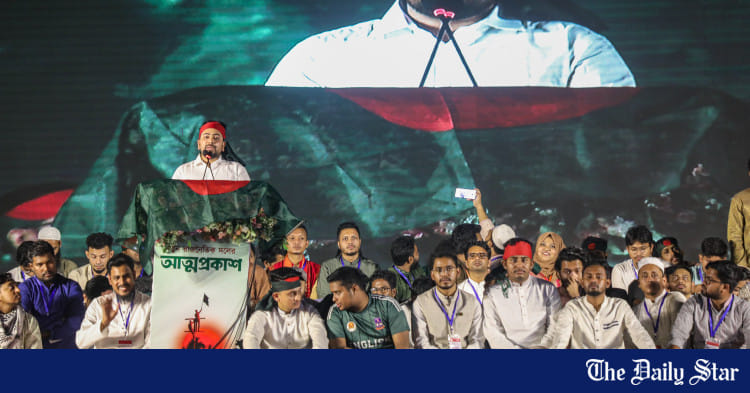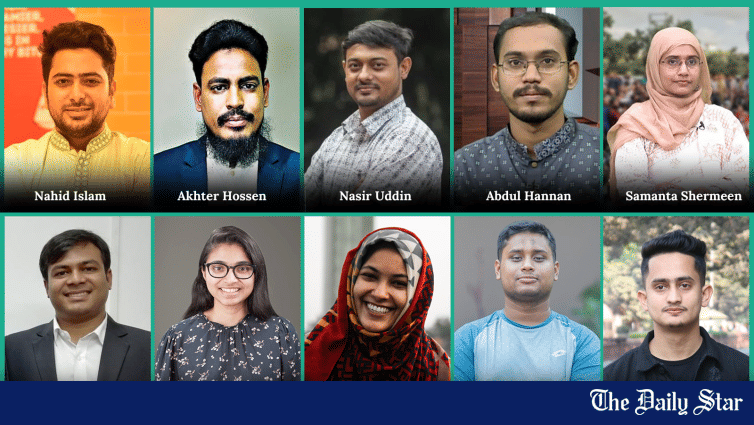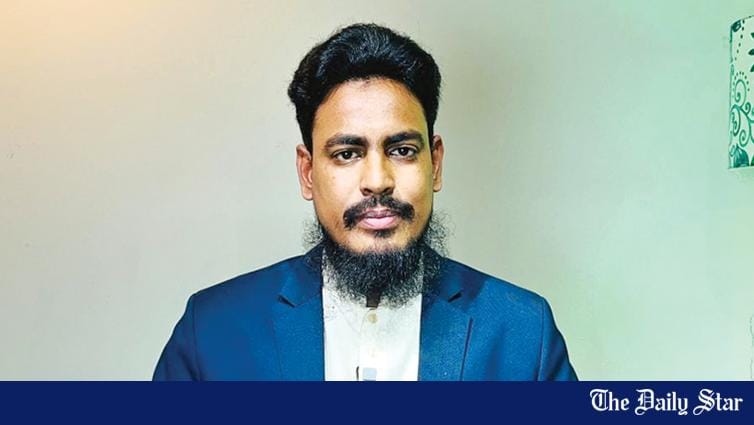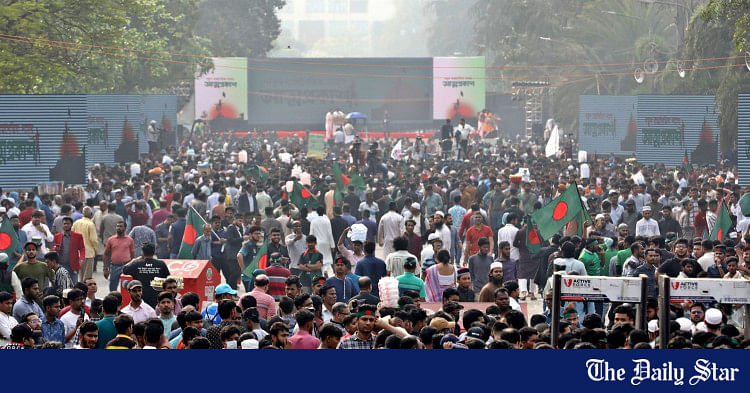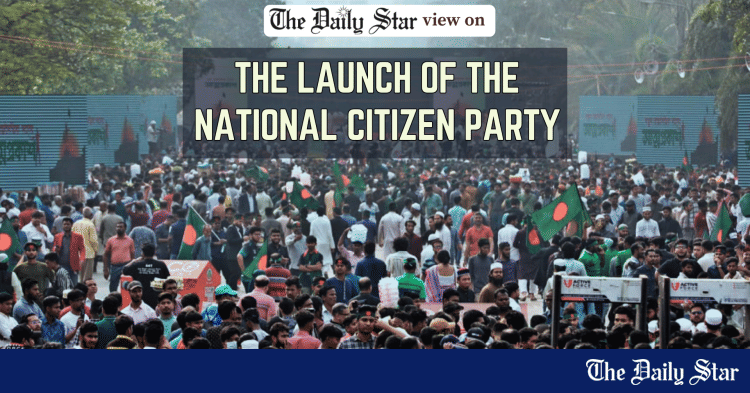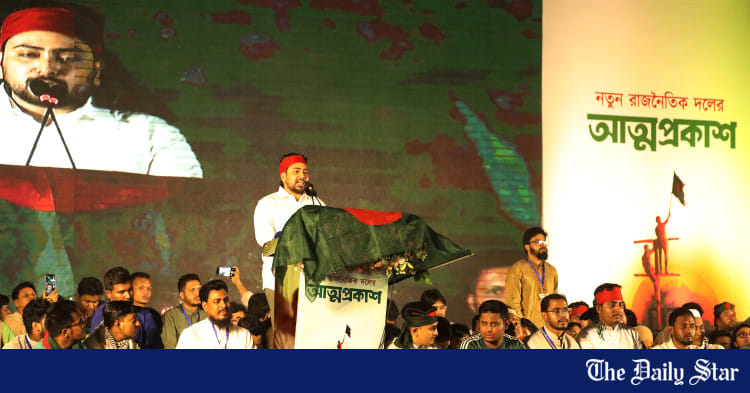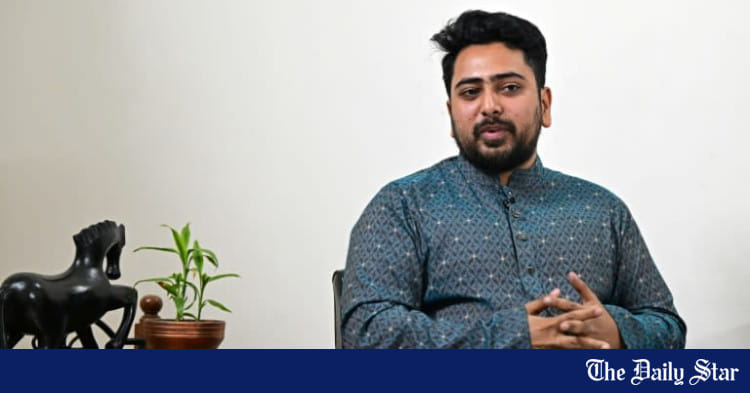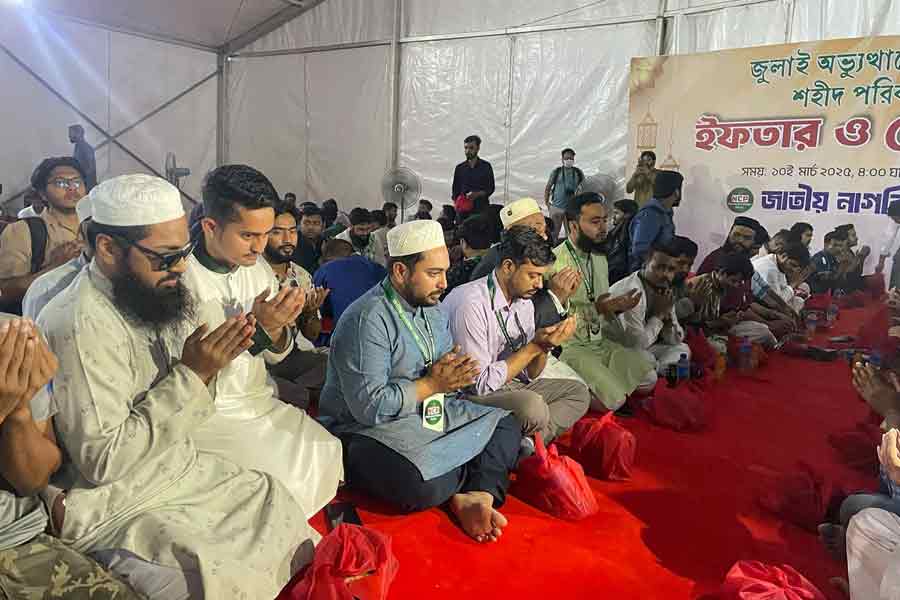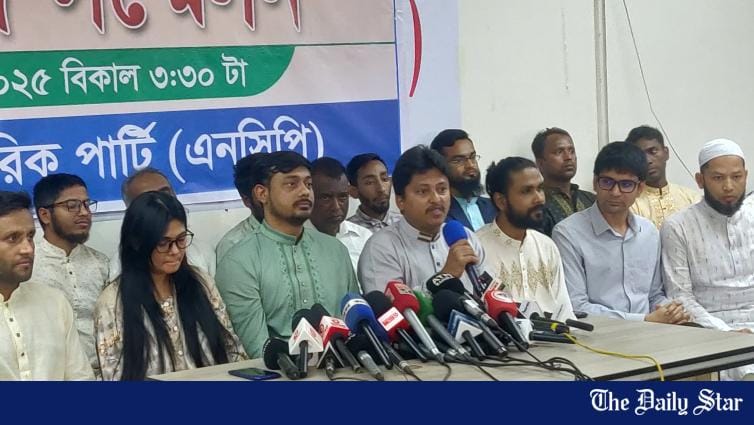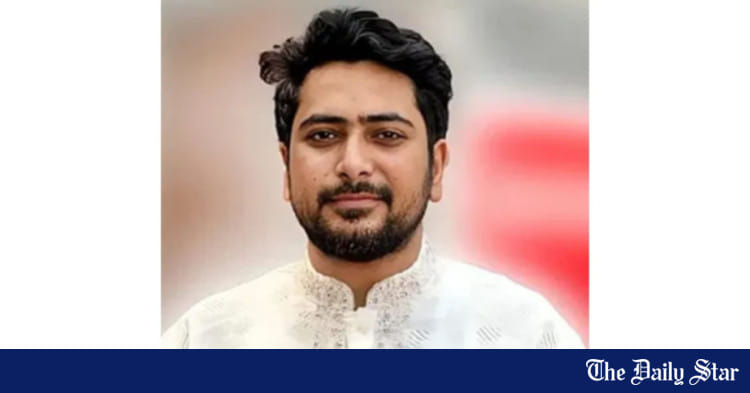Saif
Senior Member
- 13,756
- 7,411
- Origin

- Axis Group

Date of Event:
Mar 1, 2025
Second republic, new constitution: Youth float National Citizen Party
Nahid reads out National Citizen Party declaration
The National Citizen Party (NCP), a new political platform of the students who spearheaded the mass uprising last year, was officially launched today vowing to pursue the politics of national unity over division and materialise the vision for a second republic.
NCP convener Nahid Islam announced the vision for a second republic as the centrist party inaugurated at a rally on Manik Mia Avenue this evening.
Spearheaded by the Students Against Discrimination and initiated by the Jatiya Nagorik Committee, the party's declaration outlines a transformative political and economic roadmap for Bangladesh, which will begin with writing a new constitution.
In its official declaration, the party announced its mission to dismantle constitutional autocracy and adopt a new democratic constitution.
The cornerstone of this initiative is the formation of an elected constituent assembly, which will draft the new constitution to ensure democratic governance.
NCP's declaration emphasises that the July 2024 mass uprising was not merely about ousting a regime but rather about reshaping the entire political framework.
The party is committed to fostering a political culture where unity prevails over division, justice replaces vengeance, and merit triumphs over dynastic politics.
It also vows to eradicate corruption and nepotism, ensuring a fair and transparent governance system.
A significant aspect of NCP's vision is the inclusion of marginalised and disadvantaged communities.
The party asserts that in the second republic, the common people—and only the common people—will be the supreme source of power.
Protecting fundamental rights, preserving ethnic, social, gender, and cultural diversity, and ensuring strong safeguards against poverty, inequality, and abuse of power are fundamental to their vision.
The party has laid out a detailed framework for achieving its goals.
At the forefront is to rebuild broken political, social, economic, and cultural institutions to preserve their democratic nature.
Additionally, the party envisions a strong national defense system to safeguard the country's sovereignty and national interests.
The NCP prioritises the establishment of a self-sufficient, equitable, and sustainable economy through the integration of agriculture, services, and industrial production sectors.
The party pledges to prevent wealth concentration among the elite and ensure the equitable redistribution of resources.
Measures will be taken to regulate corporate syndicates and vested interests, safeguarding public and consumer rights.
To position Bangladesh as a strong regional power, the NCP plans to foster regional cooperation and international partnerships.
Additionally, the party aims to develop a modern, technology-driven economy that encourages innovation and scientific advancement.
The NCP strongly believes that the second republic is not an unattainable dream but a solemn commitment.
The party calls upon citizens to unite in this movement, saying that the struggle for democracy, justice, and equality must be relentless.
"We must eliminate all possibilities of restoring constitutional autocracy. Now is the time to dream anew, to march forward, and to build a new Bangladesh," reads the declaration.
The party urges people from all walks of life to take an oath to work towards the realisation of the second republic.
It envisions a nation where every citizen's voice is heard, where justice prevails, and where equality and human dignity are the foundation of the state.
The joint conveners of the party are Nusrat Tabassum, Monira Sharmin, Mahbub Alam, Sarwar Tushar, Advocate Mujahidul Islam Shahin, Tajnuva Zabin, Sultan Muhammad Zakaria, Dr. Atiq Mujahid, Ashraf Uddin Mahdi, Arpita Shyama Deba, Tanjil Mahmud, Anik Roy, Khaleda Saifullah, Javed Rasim, Ehtesham Haque, and Hasan Ali.
Meanwhile, the joint member secretaries are Abdullah Al Amin, Arif Sohail, Rashidul Islam Rifat, Mahin Sarkar, Mohammad Nizam Uddin, Akram Hossain, SM Saif Mustafiz, and Saleh Uddin Sifat (attached to the office cell),Alauddin Muhammad, Farid Uddin, Mohammad Farhad Alam Bhuiyan, Mohammad Miraj Mia, Lutfar Rahman, Mohammad Mainul Islam Tuhin, Mushfiqur Salehin, Dr. Zahidul Islam, Zahirul Islam Musa, Humayra Noor, Mushfiqur Rahman Juhan, Molla Mohammad Faruq Ehsan, Shagufta Bushra Bismah, Ahanaf Saeed Khan, Abu Saeed Mohammad Sujauddin, Mir Arshadul Haque, Faisal Mahmud Shant, Tarek Reza, Mashiur Rahman, Zainal Abedin Shishir, Mohammad Muntasir Rahman, Gazi Salauddin Tanvir, Tamim Ahmed, and Tahsin Riaz
Full text of NCP declaration
Against the backdrop of the July 2024 uprising of students and masses, under the leadership of the Students Against Discrimination and the initiative of the Jatiya Nagorik Committee, we, the students and masses of Bangladesh, hereby declare—
We stand as the people of the Bengal delta, bearing a rich and distinct culture shaped over a thousand years of historical evolution. After nearly 200 years of British colonial rule, the state of Pakistan was established in 1947 following a long struggle. However, the general people of this land did not attain freedom from exploitation and discrimination. Consequently, after 23 years of struggle, the people of this land waged the great liberation war of 1971, sacrificing the lives of hundreds of thousands of martyrs to achieve an independent Bangladesh. Yet, even after independence, the people of Bangladesh have had to fight repeatedly for democracy. (In 1990, the students and the masses shed their blood to overthrow a military dictatorship.) However, even after more than five decades of independence, we have failed to establish a political settlement that ensures democracy, equality, human dignity, and social justice. Instead, over the past 15 years, the country has been subjected to a brutal fascist regime that recklessly weaponised state institutions to serve the ruling party's interests and destroyed democracy. Dissenting voices were silenced, and enforced disappearances and extrajudicial killings became state policy, while widespread corruption and money laundering turned into a systemic culture.
In July 2024, through immense sacrifice, the students and the masses orchestrated an unprecedented uprising, toppling the fascist regime that had gripped the country for nearly a decade and a half. However, we must remember that this new freedom, won through the sacrifices of countless martyrs, was not simply to replace one government with another. Rather, the people rose in response to the aspiration of dismantling the entrenched fascist system and rebuilding the state on the foundation of people's rights. It is with this vision that we announce the formation of the National Citizen Party (NCP)—a democratic, justice-oriented, and truly representative political party.
We believe that the July 2024 Mass uprising has marked the beginning of our struggle to establish a second republic. To achieve this, we must eliminate all possibilities of restoring constitutional autocracy through the adoption of a new democratic constitution. One of our primary goals is to draft a new constitution through an elected constituent assembly. Our second republic will ensure a strong national defense system to protect the nation's interests. Rebuilding broken political, social, economic, and cultural institutions and preserving their democratic nature will be our political priority. Only through these efforts can we emerge as a fully democratic state.
We strive to cultivate a political culture where unity prevails over division, justice replaces vengeance, and merit and competence triumph over dynastic politics at all levels of society and the state. There will be no place for corruption and nepotism in our politics.
In our second republic, the voices of the marginalised and disadvantaged communities will be brought into the mainstream. In our republic, the common people—and only the common people—will be the supreme source of power. The robust protection of all their democratic and fundamental rights will be the core principle of our politics. (We aim to build a pluralistic and prosperous society by preserving the nation's ethnic, social, gender, religious, and cultural values and diversity.) Our republic will ensure strong protections against poverty, inequality, and the abuse of power. No segment of Bangladesh's population will be excluded or criminalised in our second republic. Instead, every citizen will be given equal importance, and their safety and security will be guaranteed.
Economically, we aim to establish a self-sufficient, equitable, and sustainable national economy through the proper integration of agriculture, services, and production sectors. (Our economy will be sensitive to life, nature, and the environment.) Wealth will not be concentrated in the hands of a select few; instead, the equitable redistribution of resources will be the core principle of our economic policies. We will take firm steps to regulate corporate syndicates and vested interests, safeguarding consumer and public welfare. We will position Bangladesh as a strong regional power through economic advancement, fostering regional cooperation and international partnerships. We will build a modern and sustainable economy prioritising science and technology and fostering an innovation-driven culture.
Finally, we reaffirm our unwavering commitment to establishing a just and equal society. We strongly believe that the July 2024 mass uprising was not just a victory against a fascist regime but also a pledge to shape our future. Let us unite, hand in hand, to build a Bangladesh where every citizen's voice is heard—where the struggle for justice and human rights will be at the heart of politics—where equality and human dignity will form the foundation of the state.
Now is the time to dream anew, to march forward, and build a new Bangladesh!
Therefore, let us all take an oath from our respective position. Let us unite and move forward with unwavering determination in our struggle to establish the second republic.
Our country, our rights, our future—the second republic is not an unattainable dream. It is our solemn commitment!
Nahid reads out National Citizen Party declaration
The National Citizen Party (NCP), a new political platform of the students who spearheaded the mass uprising last year, was officially launched today vowing to pursue the politics of national unity over division and materialise the vision for a second republic.
NCP convener Nahid Islam announced the vision for a second republic as the centrist party inaugurated at a rally on Manik Mia Avenue this evening.
Spearheaded by the Students Against Discrimination and initiated by the Jatiya Nagorik Committee, the party's declaration outlines a transformative political and economic roadmap for Bangladesh, which will begin with writing a new constitution.
In its official declaration, the party announced its mission to dismantle constitutional autocracy and adopt a new democratic constitution.
The cornerstone of this initiative is the formation of an elected constituent assembly, which will draft the new constitution to ensure democratic governance.
NCP's declaration emphasises that the July 2024 mass uprising was not merely about ousting a regime but rather about reshaping the entire political framework.
The party is committed to fostering a political culture where unity prevails over division, justice replaces vengeance, and merit triumphs over dynastic politics.
It also vows to eradicate corruption and nepotism, ensuring a fair and transparent governance system.
A significant aspect of NCP's vision is the inclusion of marginalised and disadvantaged communities.
The party asserts that in the second republic, the common people—and only the common people—will be the supreme source of power.
Protecting fundamental rights, preserving ethnic, social, gender, and cultural diversity, and ensuring strong safeguards against poverty, inequality, and abuse of power are fundamental to their vision.
The party has laid out a detailed framework for achieving its goals.
At the forefront is to rebuild broken political, social, economic, and cultural institutions to preserve their democratic nature.
Additionally, the party envisions a strong national defense system to safeguard the country's sovereignty and national interests.
The NCP prioritises the establishment of a self-sufficient, equitable, and sustainable economy through the integration of agriculture, services, and industrial production sectors.
The party pledges to prevent wealth concentration among the elite and ensure the equitable redistribution of resources.
Measures will be taken to regulate corporate syndicates and vested interests, safeguarding public and consumer rights.
To position Bangladesh as a strong regional power, the NCP plans to foster regional cooperation and international partnerships.
Additionally, the party aims to develop a modern, technology-driven economy that encourages innovation and scientific advancement.
The NCP strongly believes that the second republic is not an unattainable dream but a solemn commitment.
The party calls upon citizens to unite in this movement, saying that the struggle for democracy, justice, and equality must be relentless.
"We must eliminate all possibilities of restoring constitutional autocracy. Now is the time to dream anew, to march forward, and to build a new Bangladesh," reads the declaration.
The party urges people from all walks of life to take an oath to work towards the realisation of the second republic.
It envisions a nation where every citizen's voice is heard, where justice prevails, and where equality and human dignity are the foundation of the state.
The joint conveners of the party are Nusrat Tabassum, Monira Sharmin, Mahbub Alam, Sarwar Tushar, Advocate Mujahidul Islam Shahin, Tajnuva Zabin, Sultan Muhammad Zakaria, Dr. Atiq Mujahid, Ashraf Uddin Mahdi, Arpita Shyama Deba, Tanjil Mahmud, Anik Roy, Khaleda Saifullah, Javed Rasim, Ehtesham Haque, and Hasan Ali.
Meanwhile, the joint member secretaries are Abdullah Al Amin, Arif Sohail, Rashidul Islam Rifat, Mahin Sarkar, Mohammad Nizam Uddin, Akram Hossain, SM Saif Mustafiz, and Saleh Uddin Sifat (attached to the office cell),Alauddin Muhammad, Farid Uddin, Mohammad Farhad Alam Bhuiyan, Mohammad Miraj Mia, Lutfar Rahman, Mohammad Mainul Islam Tuhin, Mushfiqur Salehin, Dr. Zahidul Islam, Zahirul Islam Musa, Humayra Noor, Mushfiqur Rahman Juhan, Molla Mohammad Faruq Ehsan, Shagufta Bushra Bismah, Ahanaf Saeed Khan, Abu Saeed Mohammad Sujauddin, Mir Arshadul Haque, Faisal Mahmud Shant, Tarek Reza, Mashiur Rahman, Zainal Abedin Shishir, Mohammad Muntasir Rahman, Gazi Salauddin Tanvir, Tamim Ahmed, and Tahsin Riaz
Full text of NCP declaration
Against the backdrop of the July 2024 uprising of students and masses, under the leadership of the Students Against Discrimination and the initiative of the Jatiya Nagorik Committee, we, the students and masses of Bangladesh, hereby declare—
We stand as the people of the Bengal delta, bearing a rich and distinct culture shaped over a thousand years of historical evolution. After nearly 200 years of British colonial rule, the state of Pakistan was established in 1947 following a long struggle. However, the general people of this land did not attain freedom from exploitation and discrimination. Consequently, after 23 years of struggle, the people of this land waged the great liberation war of 1971, sacrificing the lives of hundreds of thousands of martyrs to achieve an independent Bangladesh. Yet, even after independence, the people of Bangladesh have had to fight repeatedly for democracy. (In 1990, the students and the masses shed their blood to overthrow a military dictatorship.) However, even after more than five decades of independence, we have failed to establish a political settlement that ensures democracy, equality, human dignity, and social justice. Instead, over the past 15 years, the country has been subjected to a brutal fascist regime that recklessly weaponised state institutions to serve the ruling party's interests and destroyed democracy. Dissenting voices were silenced, and enforced disappearances and extrajudicial killings became state policy, while widespread corruption and money laundering turned into a systemic culture.
In July 2024, through immense sacrifice, the students and the masses orchestrated an unprecedented uprising, toppling the fascist regime that had gripped the country for nearly a decade and a half. However, we must remember that this new freedom, won through the sacrifices of countless martyrs, was not simply to replace one government with another. Rather, the people rose in response to the aspiration of dismantling the entrenched fascist system and rebuilding the state on the foundation of people's rights. It is with this vision that we announce the formation of the National Citizen Party (NCP)—a democratic, justice-oriented, and truly representative political party.
We believe that the July 2024 Mass uprising has marked the beginning of our struggle to establish a second republic. To achieve this, we must eliminate all possibilities of restoring constitutional autocracy through the adoption of a new democratic constitution. One of our primary goals is to draft a new constitution through an elected constituent assembly. Our second republic will ensure a strong national defense system to protect the nation's interests. Rebuilding broken political, social, economic, and cultural institutions and preserving their democratic nature will be our political priority. Only through these efforts can we emerge as a fully democratic state.
We strive to cultivate a political culture where unity prevails over division, justice replaces vengeance, and merit and competence triumph over dynastic politics at all levels of society and the state. There will be no place for corruption and nepotism in our politics.
In our second republic, the voices of the marginalised and disadvantaged communities will be brought into the mainstream. In our republic, the common people—and only the common people—will be the supreme source of power. The robust protection of all their democratic and fundamental rights will be the core principle of our politics. (We aim to build a pluralistic and prosperous society by preserving the nation's ethnic, social, gender, religious, and cultural values and diversity.) Our republic will ensure strong protections against poverty, inequality, and the abuse of power. No segment of Bangladesh's population will be excluded or criminalised in our second republic. Instead, every citizen will be given equal importance, and their safety and security will be guaranteed.
Economically, we aim to establish a self-sufficient, equitable, and sustainable national economy through the proper integration of agriculture, services, and production sectors. (Our economy will be sensitive to life, nature, and the environment.) Wealth will not be concentrated in the hands of a select few; instead, the equitable redistribution of resources will be the core principle of our economic policies. We will take firm steps to regulate corporate syndicates and vested interests, safeguarding consumer and public welfare. We will position Bangladesh as a strong regional power through economic advancement, fostering regional cooperation and international partnerships. We will build a modern and sustainable economy prioritising science and technology and fostering an innovation-driven culture.
Finally, we reaffirm our unwavering commitment to establishing a just and equal society. We strongly believe that the July 2024 mass uprising was not just a victory against a fascist regime but also a pledge to shape our future. Let us unite, hand in hand, to build a Bangladesh where every citizen's voice is heard—where the struggle for justice and human rights will be at the heart of politics—where equality and human dignity will form the foundation of the state.
Now is the time to dream anew, to march forward, and build a new Bangladesh!
Therefore, let us all take an oath from our respective position. Let us unite and move forward with unwavering determination in our struggle to establish the second republic.
Our country, our rights, our future—the second republic is not an unattainable dream. It is our solemn commitment!

